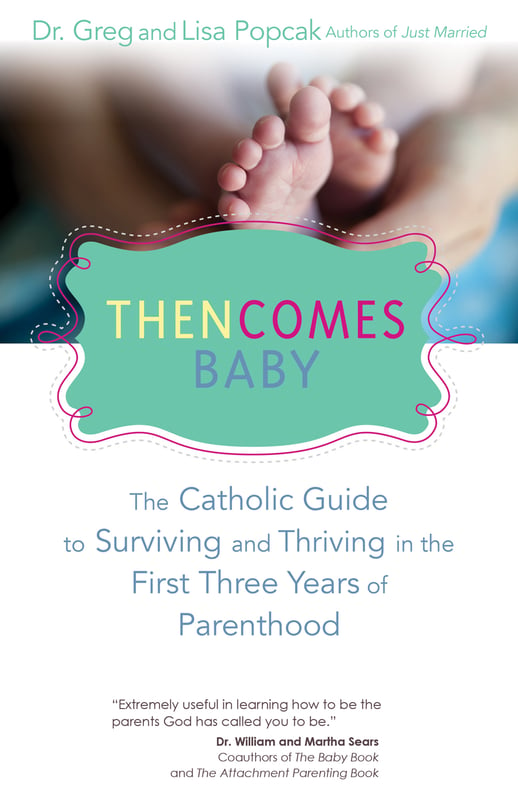Editor's Note: Dr. Greg and Lisa Popcak are among the featured authors for the celebration of National Marriage Week at Ave Maria Press. Here they share an excerpt from Then Comes Baby, a book for young parents who want to strengthen their marriage. --Barb
[tweet "Book by @DrGregandLisa helps parents strengthen #marriage #thencomesbaby @avemariapress"]
Our Catholic faith tells us that children are a gift from the Lord and that having children gives parents an opportunity to grow even closer to each other in the family school of love.
We know that a lot of parents roll their eyes at this. Conventional wisdom, and even some research, suggests that once children come on the scene, marriage is doomed. Then again, another study shows not only that the birth of children makes couples happier, but that the more kids a couple have, the hap- pier they are!
Obviously there is more to the story. It turns out that how a couple handles the birth of their children is what spells the difference between postpartum marital bliss and marital diss! In this chapter, we show you how to make sure you are among those couples whose marriage improves with children—just like our faith says it can.
Jake and Carrie Ann
Jake and Carrie Ann are the proud parents of Elise, a happy four-week-old baby girl. Everyone is doing really well in general, but Jake and Carrie Ann have been experiencing some tension in their marriage. “It’s just been really hard balancing everything,” says Jake. “I think we’re doing a pretty good job with work and the house and the baby, but I just feel like our relationship is getting lost in the shuffle. We used to make time to talk in the evenings but Carrie Ann’s so tired these days, and we aren’t getting that time to connect. We haven’t been on a date since Elise was born and, of course, Carrie Ann isn’t any- where near ready to resume our sex life. As happy as I am about being a dad is as nervous as I feel that I’m losing my best friend.”
“And I just feel pressured and like I’m letting him down,” says Carrie Ann. “I’m really doing the best I can being there for Elise and Jake—never mind me—but I’m just so tired. I feel like I should be back to normal by now. I see these moms on TV and in the magazines who are back to pre-baby weight and running around, and I’m just nowhere near any of that. I love Jake, but I just don’t have it in me to be there the way I used to be, so I feel like I’m disappointing him. Then I get resentful. I never thought I’d feel this way, but around the edges, I’ve caught myself thinking of him like he’s another kid that needs my attention, and I just want to yell, ‘Please, will you just grow up!’ I know that’s not right. I don’t want to feel that way, but there it is.”
“I’m picking up on that big time,” says Jake. “I’m not trying to put pressure on her. I keep thinking that taking time for our relationship would be good for both of us but somehow it keeps getting turned around like I’m making it about ‘me.’ I don’t get that. It really hurts my feelings. I asked her the other day about getting my mom to watch Elise so we could go out to dinner. I thought Carrie Ann would like a night out to get away. She got upset! I’m not trying to make this about me, but I’m not sure how to remind her that we’ll both feel better individually if we take care of us.”
“I did get upset about the date thing, and I feel bad about that,” says Carrie Ann. “But I just feel like Jake doesn’t get it. Of course I love him. Of course I want to spend time with him, but the date idea was just not gonna work for me. In the first place, I just don’t feel comfortable leaving the baby already. I’m nursing, and that relationship is really important. Sure, I could pump, but then if my milk dries up from not nursing for a couple of hours, I would be really sad. I just don’t want to take that chance right now. I know he thinks I’m crazy for that, but that’s where I’m at and I wish he could understand. And second, I’m just too exhausted to even think about getting ready to go out to a fancy restaurant. I’m still really uncomfortable. I mean, I’m getting out and doing what I have to do, but the thought of putting on all my makeup and doing my hair and getting on a pretty dress and heels just makes me feel so overwhelmed. I’m not even sure I have something that fits, and I just don’t need the torment of going through my closet right now. God help me, I know I should have been grateful that he wanted to take me out, but I just wanted to rip his face off! What’s wrong with me?”
There isn’t anything seriously wrong with Jake and Carrie Ann. Their experience is pretty normal. Even so, it can feel a little disturbing if you didn’t know what to expect. Here’s the good news. Jake and Carrie Ann’s marriage isn’t falling apart. They’re just in transition. The things they used to do to try to connect aren’t working anymore. They can and—with a little creativity, consultation, and commitment—will discover new ways to connect eventually, but right now, rather than engaging the creativity we discussed in the last chapter, Jake and Carrie Ann are clinging to the old ways of connecting: talking in the evening, going on date nights. Unfortunately, those things just aren’t going to work the same way right now. They might work again at some point in the future, but right now, Jake and Carrie Ann need some new ideas. In this chapter, we look at some ideas for taking great care of your marriage once your baby arrives on the scene.
The Marriage Dynamic with Baby Added In
The first thing to look at is the marriage dynamic. As we noted in our book Just Married: The Catholic Guide to Surviving and Thriving in the First Five Years of Marriage, the wife tends to be the relationship caretaker during the early, prebaby years in lot of marriages. It is often the wife who reminds her husband about the importance of making time to talk, or pray, or see friends, or have a date.
Once Baby comes along, the wife’s attention is drawn to the very important work of bonding with Baby. Hopefully by now, based both upon our discussions and your personal experience, you realize that strong bonding and attachment doesn’t just happen. It takes real effort. Because of this new responsibility, however, the wife no longer has the time or energy to be the relationship caretaker—at least not to the same degree as before. At this point, one of two things can happen.
Option 1: Loneliness and Baby-Phobia
The first possibility is that the husband will expect things to stay as they were. Assuming that his wife will maintain her role as relationship caretaker, he just waits for her to start taking care of things again. He may experience feelings of jealousy toward the baby and become somewhat withdrawn. In turn, his wife will become resentful as she comes to see him as “another kid” she has to attend to. Depending on how things play out, the couple could recover as the baby gets older and the wife can resume her relationship caretaking role (although such a couple would probably be somewhat baby-phobic in the future), or this could be the beginning of the end of the romantic relationship altogether as the wife loses herself in taking care of the children and the husband further distances himself, assuming that “this is just the way it is” once you start having kids.
Option 2: Deeper Intimacy
The second option is much more hopeful and rewarding. In this scenario, the husband makes it his job to take as good care of his wife as she takes care of the baby. He works hard to ask her what she needs and to follow through on her requests. He also keeps his eyes open so that he can try his best to anticipate needs that she may not be able to express. He doesn’t impose his agenda on her (e.g., you MUST go on a date night with me; you MUST give my mom the baby and get out to do something for yourself). He realizes that, in these early months, Mom is nesting with her baby. Well-intentioned though they may be, ideas for creating marital connection or providing mom care that tear Mom out of the nest or even potentially put distance between Mom and baby can automatically feel threatening or, at the very least, undesirable. Remember, especially during these early weeks and months, baby’s brain and bodily systems are synching up with Mom’s brain and bodily rhythms—that’s the physiological component of attachment and bonding. If a mom is properly bonded, leaving baby at this stage often feels physically threatening. A mom can be pushed to ignore this feeling, but she’ll usually resent it; and even if you can get her to do what she is being asked, it rarely pays off the way the couple hopes it will. Therefore, strategies for connection and mom care have to respect the nesting/bonding instinct.
Time to Revisit Those Connecting Rituals
This is where the importance of the rituals for work, play, talk, and prayer, which we discussed in chapter 3, shows itself. If you had these rituals well established before and throughout the pregnancy, then chances are you are in a pretty good place regarding your confidence in the relationship and your level of rapport. You are used to being intentional about them, so making an effort in this area will feel normal.
If you haven’t created those connecting rituals before Baby, then you may have a little more work to do because you just aren’t as used to being intentional about these activities. They “just happened” before, and now it’s going to take more effort. That’s okay. Just know that this is a normal transition and that any growing pains you feel (in the form of some disconnection from your spouse or concern about the relationship) are nor- mal. How quickly those feelings pass will depend upon how hard and intentionally you work to establish those connecting rituals now.
If you already have well-established connecting rituals for work, play, talk, and prayer, take time to revisit those. Chances are, many of the habits you cultivated around these rituals won’t work now or won’t work as easily. That’s not to say that they might not work again at some point in the future, but you may need to identify simpler variations for this new phase of your marriage.
For instance, if you used to take a weekly date night out every Friday evening, perhaps for the next several months, you will want to have a date night in. Get takeout from your favorite restaurant or make a nice meal. Bring out the good plates. Light candles. Create a romantic music channel on your Internet radio app. Present a small gift (e.g., a card with a poem, flowers, a small charm for a bracelet, or a note that lists all the things you love about your spouse). Even a couple on the tightest budget can write a love note or do something thoughtful for each other. Sure, the date’s at home, but it can still be special. Be creative. Again, the husband can take charge of this. Sweep her off her feet. Use this time to make her feel 100 percent loved and cared for. Your efforts will show her that you are the man she can lean on and find her strength in, instead of one more responsibility to attend to.
Here are a few more examples. Perhaps you used to have a work ritual around gardening, but Mom isn’t feeling very much like squatting in the dirt these days. Perhaps your new work ritual could be bathing your baby together! This was something we did, and it was great fun watching our baby interact with the water and discover his fingers and toes. It was a great time for light conversation too!
If you used to take time to talk after dinner, but your baby is fussy at this time, perhaps you will want to take time to talk while the baby is nursing. Remember what we wrote in the last chapter about avoiding arbitrary rules that make your life harder. Everything we said about such rules when it comes to mom care applies twice as much to relationship care. Too many couples fall into all-or-nothing thinking when it comes to meeting their couple needs: “If we can’t get date time, talk time, prayer time, or project time the way we want to get it, the way we used to get it, or the ideal way we’d prefer to get it, then we just won’t get it.” This is a profoundly foolish attitude that leads to marital breakdown and resentment toward parenthood. The important thing at this stage is getting the needs for work, play, talk, and prayer met in any way you can and maintaining your connections across these important categories. You can always improve on these rituals and get more out of them later on. For now, with a new baby, count merely making them happen relatively consistently a huge success that will benefit your marriage and budding family for years to come.
Buy this book through our Amazon link and support CatholicMom.com with your purchase!
Be sure to check out our Book Notes archive.
Copyright 2017 Dr. Greg & Lisa Popcak. Reprinted here with the kind permission of the publisher, Ave Maria Press.
 About the authors: Gregory K. Popcak is a psychotherapist, the executive director of Pastoral Solutions Institute, and the author or coauthor of more than twenty popular books and programs integrating Catholic theology and counseling psychology. He is an expert on the practical applications of the theology of the body. His books include Just Married, Then Comes Baby, and Parenting with Grace. He is a regular contributor to Catholic Digest, Family Foundations, and other magazines. He hosts More2Life with his wife, Lisa, on Ave Maria Radio. The couple has three children and lives in Ohio.
About the authors: Gregory K. Popcak is a psychotherapist, the executive director of Pastoral Solutions Institute, and the author or coauthor of more than twenty popular books and programs integrating Catholic theology and counseling psychology. He is an expert on the practical applications of the theology of the body. His books include Just Married, Then Comes Baby, and Parenting with Grace. He is a regular contributor to Catholic Digest, Family Foundations, and other magazines. He hosts More2Life with his wife, Lisa, on Ave Maria Radio. The couple has three children and lives in Ohio.
About the Author

Guest
We welcome guest contributors who graciously volunteer their writing for our readers. Please support our guest writers by visiting their sites, purchasing their work, and leaving comments to thank them for sharing their gifts here on CatholicMom.com. To inquire about serving as a guest contributor, contact editor@CatholicMom.com.




.png?width=1806&height=731&name=CatholicMom_hcfm_logo1_pos_871c_2728c%20(002).png)
Comments